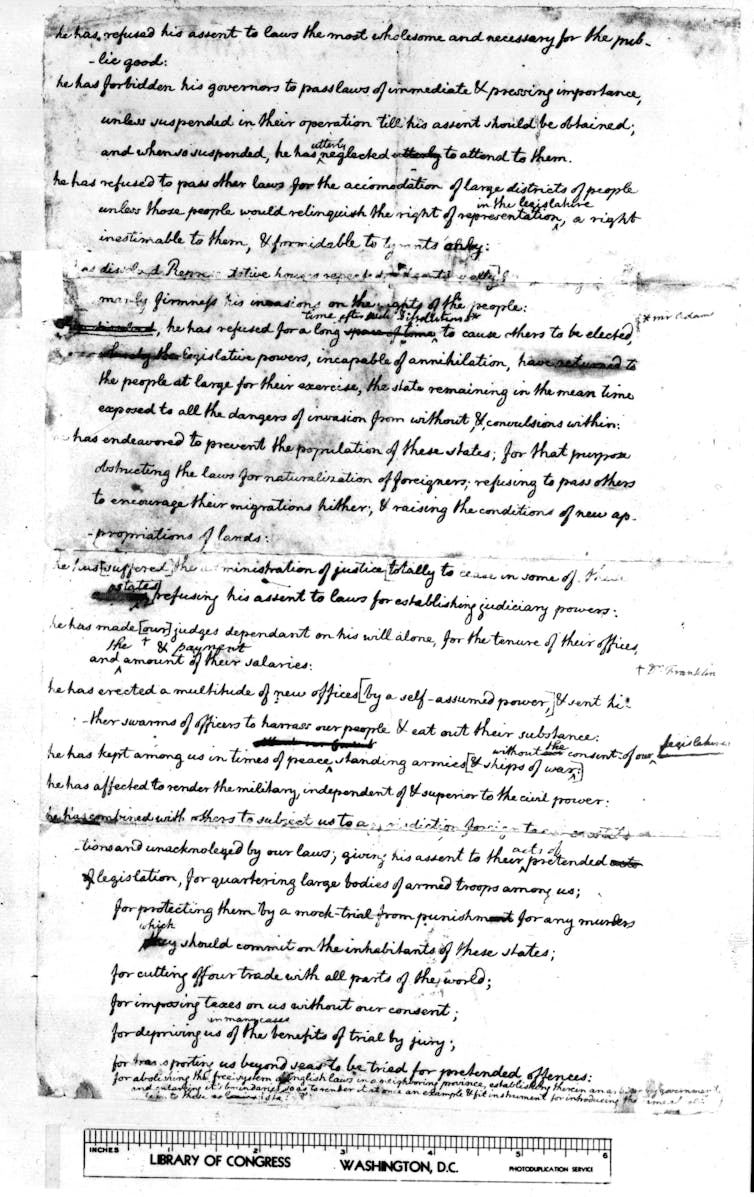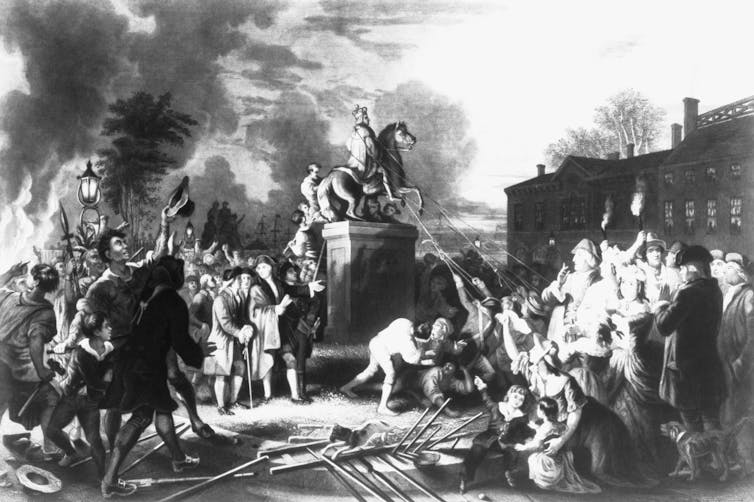George III, king of Nice Britain and its colonies on the time of the American Revolution, has been maligned unfairly.
Throughout each the primary and now the second time period of President Donald Trump, commentators within the U.S. have invoked the king’s misdeeds to criticize Trump. When the president bypassed Congress to create a brand new authorities company, appointed its head and stopped fee of hundreds of thousands of {dollars} of allotted federal funds, his critics famous that he assumed the function of Congress, an influence seize that supposedly made him much like George III. Based on this criticism, the president engaged in tyranny, simply because the founders accused George of doing.
As a scholar of early America, I imagine, nevertheless, that George III has gotten a nasty rap. He was not the omnipotent monarch that Trump allegedly aspires to be.
Within the 1770s, the ability of the British king was restricted by the authority of Parliament. In that system, which Individuals and others praised on the time as balanced, the king and the legislature every had particular duties and powers in order that neither might management the federal government alone.
George III was not an absolutist monarch, to make use of the language of the day for a power-hungry ruler. The English had struggled within the earlier century over the extent of the king’s energy. After preventing two civil wars, executing one king, and, ultimately, forcing the monarch to conform to rule with Parliament fairly than on his personal, they believed their liberties had been safeguarded.
This method, generally known as restricted monarchy, was the satisfaction of Nice Britain. It was additionally admired by the American founders. As late as 1774, in his Abstract View of the Rights of British America, Thomas Jefferson praised the “free and ancient principles” of the British structure during which “kings are the servants, not the proprietors of the people.”
Trump has been in contrast with King George III by many writers and commentators; the White Home on Feb. 19, 2024, issued the faux journal cowl of Trump topped like a king.
Numerous
No kingly tyranny
Britons, whether or not in Nice Britain or the colonies, did concern a tyrant, a controlling and abusive chief.
Some fears got here from their examine of political concept, which taught that authorities labored greatest when composed of assorted branches that represented the issues of the completely different political courses.
As this concept went, an unbalanced authorities would descend into tyranny with a too-powerful monarch; oligarchy beneath a dominant aristocratic class; or anarchy with the folks uncontrolled. They believed these perils might be prevented solely by sustaining stability.
Despite the fact that the British didn’t concern imbalance or a tyrant king in their very own case, they may see the hazard threatening elsewhere in Europe.
France represented a worst-case state of affairs. Its absolutist kings had dominated with out France’s legislature – the Estates Common – for greater than a century and a half on the time of the American Revolution. British poet Robert Wolseley’s usually reprinted poem declared: “Let France grow proud beneath the tyrant’s lust, While the rackt people crawl and lick the dust. The mighty Genius of this isle disdains Ambitious slavery and golden chains.”
Inside just a few years, Anglo-American criticism of kingly tyranny in France could be validated: That nation descended right into a violent revolution that resulted in a long time of warfare and political violence, together with the execution of the complete royal household.
This expertise confirmed for the British and Individuals {that a} balanced system was greatest and that they need to depend their blessings.
Why revolt?

An inventory of grievances held by the American Colonies towards King George III, set down in Thomas Jefferson’s first draft of the American Declaration of Independence, which finally included 27 grievances towards the king.
MPI/Getty Photos
If the American revolutionaries admired the British system and sought to repeat it in the US, why did they reject the hyperlink to Britain and revolt within the first place?
Individuals didn’t revolt towards the character of British authorities. Slightly they objected to their altering place inside the British Empire. The revolutionary disaster had a variety of roots, however most of them arose out of adjustments within the administration of the connection between the American Colonies and the imperial heart.
From the 1760s, the British authorities took a extra activist function in its American Colonies, limiting their geographical enlargement and imposing taxes immediately on the inhabitants. Prior to now, Colonists had been free to maneuver west, challenged solely by the indigenous residents who fought to defend their lands.
Now the British authorities, aiming to place an finish to those wars, blocked enlargement. On the identical time, to pay down the debt accrued in latest battle with France – and fought partly in North America – the federal government levied taxes not through the Colonial legislatures, because it had earlier than, however immediately on residents. This variation sparked revolt and, ultimately, revolution.
Turning on the king

American Colonists pull down a statue of King George III in New York Metropolis through the American Revolution.
Corbis through Getty Photos
Earlier than 1776, the Colonists believed that George III would come to their rescue and halt these adjustments imposed by Parliament. They thought initially that he didn’t notice how the brand new insurance policies affected them.
Solely in 1776 did they settle for that George III supported the coverage adjustments and wouldn’t defend their rights. It was in that context that they turned on him and declared him tyrannical, blaming him for the brand new insurance policies and calling for a break with Britain. Because the Declaration of Independence mentioned: “The history of the present King of Great Britain is a history of repeated injuries and usurpations, all having in direct object the establishment of an absolute Tyranny over these States.”
Though they complained concerning the tyranny of George III, their true objection was that their subordinate place inside the empire gave them little leverage when opposing insurance policies that king and Parliament agreed to impose on them.
As soon as unbiased, the founders created a system that imitated the British mannequin of blended governance and created obstacles – the powers of Congress and the oversight of the Supreme Court docket – that they hoped would safeguard their liberties towards the specter of renewed tyranny.



